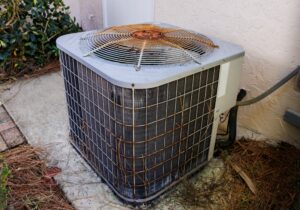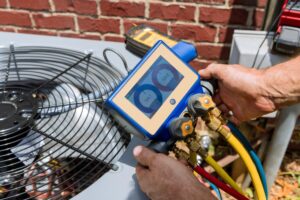Have you ever noticed that sometimes your allergies seem worse when you’re inside than when you’re out and about? If so, you’re not alone. Many allergy sufferers experience this phenomenon, and it could be a sign that your HVAC system is distributing allergens throughout your home. The good news is that there are several things you can do to combat this problem and alleviate your allergy symptoms using your HVAC system.
Let’s explore some effective HVAC allergy solutions that can help you breathe easier and enjoy a more comfortable home environment.
Use High-Quality Air Filters as Your First Line of Defense
One of the most straightforward and effective ways to alleviate allergies with your HVAC system is by using high-quality air filters. These filters trap allergens like dust, pollen, and pet dander before they can circulate through your home. Consider choosing filters with a high MERV (Minimum Efficiency Reporting Value) rating to capture even the smallest particles. For most homes, filters with a MERV rating between 8 and 12 are sufficient, but if you have severe allergies, consider using filters rated 13 or higher.
Also, don’t forget to replace or clean your filters regularly, even if you use a high-efficiency filter. You should change it every 1-3 months, depending on usage, whether you have pets, and whether someone in the house smokes.
Install an Air Purification System for an Extra Layer of Protection
While high-quality filters can do a lot to improve your indoor air quality, adding an air purification system to your HVAC setup can provide an extra layer of protection against allergens. There are several types of air purification systems that can be integrated into your existing HVAC system:
- UV Light Purifiers: These systems use ultraviolet light to kill bacteria, viruses, and mold spores as air passes through your HVAC system. UV light can be particularly effective at reducing allergens that filters might miss.
- Ionizers: These devices release negatively charged ions into the air, which attach to airborne particles, causing them to become too heavy to remain airborne. They then fall out of the air and can be easily vacuumed up.
- Photocatalytic Oxidation (PCO) Cleaners: These advanced systems use UV light and a catalyst to convert harmful airborne contaminants into harmless substances like water and carbon dioxide.
By using one of these air purification systems, you can further improve your indoor air quality and make sure your HVAC system provides the allergy relief your family craves.
Control Humidity Levels to Keep Allergens at Bay
Did you know that the humidity level in your home can have a significant impact on your allergies? High humidity levels can create an environment where dust mites, mold, and other allergens thrive. Additionally, air that’s too dry can irritate your nasal passages and make allergy symptoms worse.
Your HVAC system can help regulate the humidity level in your home to ensure it’s within a comfortable and healthy range, typically between 30-50%. If you notice that your home feels particularly humid, if you see signs of mold growth, or if you’re suffering from consistently dry skin, it might be time to invest in humidity control solutions, such as a whole-home dehumidifier or humidifier. These pieces of equipment can work in conjunction with your HVAC system to maintain ideal humidity levels year-round.
Last But Not Least, Keep Up With HVAC Maintenance
To ensure that your HVAC system continues to effectively alleviate your allergy symptoms, invest in regular maintenance from a professional technician. A well-maintained system not only operates more efficiently but also does a better job of filtering and purifying your home’s air. At least once a year, a technician should clean your system, check for any issues, and ensure it’s operating at peak efficiency.
Between professional appointments, you can do a few things to keep allergies at bay. First, keep your outdoor unit clear of debris, leaves, and plants that could impede airflow. Then, clean your indoor vents and returns to prevent dust buildup. With these steps (and your typical cleaning habits), you can effectively reduce the spread of allergens and keep your system running smoothly.
Breathe Easier With Our HVAC Allergy Solutions
Your HVAC system can be a powerful ally in the fight against allergies. By implementing these strategies, you can significantly improve your indoor air quality and alleviate your allergy symptoms. If you need help choosing the best HVAC allergy solutions for your home, connect with the experts at H.J. Faust, Inc. today. Our team can assess your home’s unique needs and recommend tailored indoor air quality solutions.



